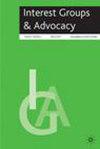分散的利益集团和监管政策变化:土耳其的金融消费者保护
IF 1.5
Q2 POLITICAL SCIENCE
引用次数: 3
摘要
这篇文章探讨了土耳其在长期的监管宽容之后,为什么以及如何出台零售银行费用、佣金和收费的监管。文章表明,当监管宽容导致停滞,“国家主义”、排他性的决策环境限制了消费者群体参与决策过程时,消费者群体通过向另一个国家行为者海关和贸易部上诉,挑战了银行业和监管机构的政策制度。该部利用一个机会结构通过了一项新的消费者保护法,该法赋予监管机构监管费用、佣金和收费的事实授权。文章认为,监管政策的变化是政策制度变化的产物,该部成为了一个否决者,因为它重新定义了决策过程中的体制安排,并强加了其偏好和更严格的政策方法。因此,这篇文章有助于我们理解分散的利益集团如何引发监管政策变化,但更重要的是政策制度变化的条件。本文章由计算机程序翻译,如有差异,请以英文原文为准。
Diffuse interest groups and regulatory policy change: financial consumer protection in Turkey
This article examines why and how a regulation on retail banking fees, commissions, and charges emerged in Turkey after a long period of regulatory forbearance. The article shows that when regulatory forbearance caused stasis, and the “statist”, exclusionary policymaking context limited consumer groups’ access to the policymaking process, consumer groups challenged the policy regime of the banking sector and the regulator by appealing to another state actor, the Ministry of Customs and Trade. The Ministry took advantage of an opportunity structure to pass a new consumer protection law which assigned a de facto mandate on the regulatory agency to regulate fees, commissions, and charges. The article argues that the regulatory policy change was a product of a policy regime change with the Ministry emerging as a veto player, as it redefined the institutional arrangements in the policymaking process, and imposed its preferences and its stricter policy approach. As such, the article contributes to our understanding of the conditions of how diffuse interest groups can trigger regulatory policy change, but more importantly policy regime change.
求助全文
通过发布文献求助,成功后即可免费获取论文全文。
去求助
来源期刊

Interest Groups & Advocacy
POLITICAL SCIENCE-
CiteScore
2.60
自引率
25.00%
发文量
26
期刊介绍:
Interest Groups & Advocacy will engage broadly with the politics of interests. It will record and analyze how advocacy by groups, movements and lobbying professionals shapes policy, and it will address important debates about how such interests are mobilized and maintained. It will cast a wide net across politics and society to identify the forces, strategies, and tactics that determine policy change. Open to diverse methodologies, it welcomes studies that address theoretical issues, report rigorous empirical work, and deliver insight on the range of change agents and their behaviour and impact.
Although this is a field traditionally dominated by American political science, in recent years there has been a widening geographical range as scholarly attention has reflected the growth of numbers, lobbyists have proliferated, and spending has increased in Europe, and in many states, provinces and localities around the world. Such territorial expansion of focus has been accompanied by broadened interest in the number and type of advocacy organizations, (far from the textbook stereotypes of interest groups), such as multi-national corporations, NGOs, and social movements, that seek to influence public policies.
With the active assistance of a diverse and experienced editorial board, the Editors explicitly seek to create a visible, well-regarded journal with the highest standards.
Whether in addressing historical issues or recent events, prospective articles should be sophisticated and of interest to a wide audience. We seek incisive, well-researched, and well-written articles. These qualities are especially important given our desire to attract contributions and attention from practitioners in the worlds of lobbying and group organization. Alongside the Editorial Board there is a Practice Panel to ensure our contents are credible in the world of practice.
Although this journal is anchored within political science, these aims will not be addressed satisfactorily without submissions from other disciplines, such as economics, sociology, law, and history. Social movement scholarship clearly falls under the broad field; likewise, public affairs makes up a major component of the process of competitive advocacy that is now commonplace as a proxy for democratic contestation.
The Editors and the editorial board welcome contributions in this broad area and intend to respond promptly to authors, with a goal of communicating decisions in no more than six weeks.
Although these matters have long received scholarly attention, they have never commanded the attention of a single journal and specialist reviewing. We look forward to establishing Interest Groups & Advocacy as this focal point.
 求助内容:
求助内容: 应助结果提醒方式:
应助结果提醒方式:


